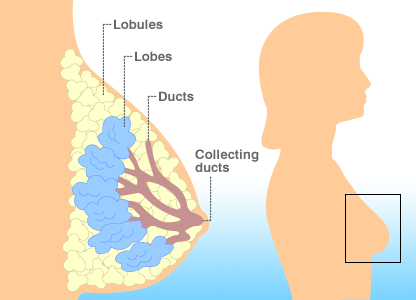Every woman runs the risk of getting breast cancer as she gets older, chances are veće.Šanse for breast cancer of women is 14 percent or one in every eight women, when you consider the lifespan of women, assuming a living until the age of about 90 years. If you feel that your life of 90 years, chances are 14 percent, you'll get bolest.Dobra news is that 86 percent will not get the disease.
How do genetics affect your chances of getting breast cancer?
Most cases of hereditary breast cancer are associated with two genes for breast cancer gene 1 (BRCA1) and breast cancer gene 2 (BRCA2). These two genes play a role in maintaining breast cells growing normally and to prevent any growth of cancerous cells. However, an abnormal BRCA 1 and BRCA2 genes increase the risk of an individual breast cancer. These genes typically comprise up to 10 percent of all cases of breast cancer.
While most women who have breast cancer have no family history of diabetes, women who are diagnosed with the disease and also have an abnormal BRCA1 or BRCA2 gene often women with a family history of disease.
These abnormal BRCA1 and BRCA2 genes may be acquired or inherited. Acquired is not inherited and the gene becomes abnormal as a result of errors in this gene plays, wear and tear, exposure to toxic materials, hormonal influences, diet, environmental factors, or sometimes even unknown factors. Inherited from parents, it is a normal gene from one parent and one abnormal gene from the other. They are born with this abnormal gene. 85 percent to 90 percent of breast cancers are the result of acquired genetic abnormalities.
chances that an individual will have an abnormal breast cancer gene are as follows:
. If an individual in the family suffers from both ovarian and breast cancer.
. If any individual's mother or paternal sister, aunt, mother or grandmother had breast cancer diagnosed before the age of 50 years.
. Female in each family had breast cancer.
. Women in some families had cancer in both her breasts.
. If one is from Eastern Europe.
If an individual's mother or father has an abnormal breast cancer gene, the chances of passing the gene to which the individual is 50 posto.Šanse for an individual to pass on to their children is 25 percent, provided that the father does not have an abnormal gene. This does not necessarily mean that all family members will have an abnormal gene, if one family member has.
of men and breast cancer
Men are at increased risk of breast cancer if they inherit the abnormal gene for breast cancer. Through man's life, the risk is about 6 percent, which is about 80 times higher than for a man without abnormal breast cancer gene.
The study also found that men who have abnormal breast cancer gene are more likely to get prostate cancer than men who do not. This abnormal gene also has the same effect on the increased cancer of the digestive tract, or skin cancer.


